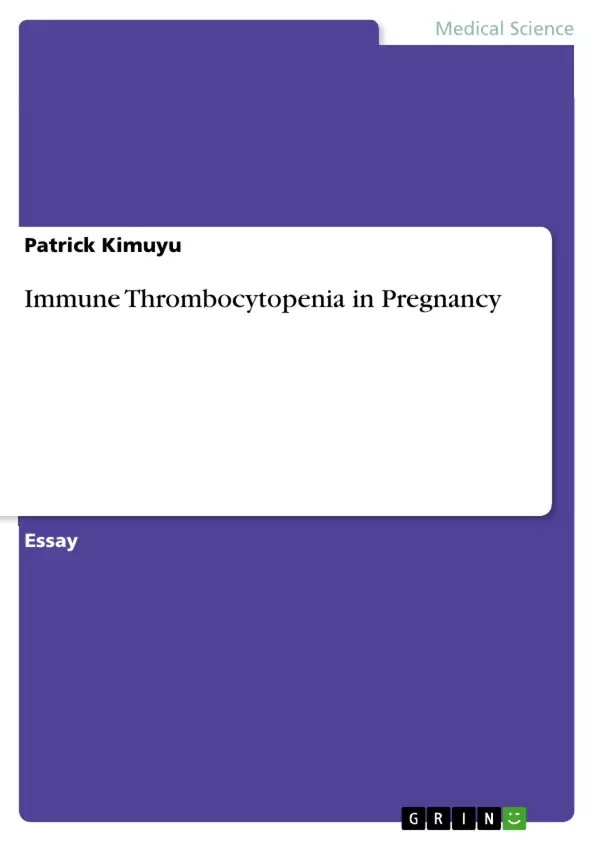Thrombocytopenia occurs mostly in pregnant women, in which immune thrombocytopenia is believed to be one of the least prevalent forms of thrombocytopenia. Clinical studies indicate that immune thrombocytopenia occurs at a low rate of 11% compared to gestational thrombocytopenia, which occurs at a rate of 59%. However, it is characterized with moderate and severe thrombocytopenia with platelet counts decreasing below 100x109/L. Ordinarily, immune thrombocytopenia is caused by auto-immune reactions against platelets by anti-platelet antibodies, which destroy glycoprotein membranes forming platelet membranes.
Immune thrombocytopenia in pregnancy causes several risks to women and newborns. ITP pregnant women experience high risks of maternal hemorrhage compared to those suffering from other forms of thrombocytopenia. Despite the low percentage of ITP rates in pregnant women, extensive monitoring and management are required, primarily during prenatal care to reduce the risks associated with the disorder.
On the other hand, immune thrombocytopenia in pregnancy presents numerous neonatal concerns. The notion that, immune thrombocytopenia influences delivery alternatives has been disapproved by the recent clinical reports, which are based on randomized clinical trials. In the past, cesarean delivery was considered as a significant obstetric indication in ITP pregnant women. Currently, vaginal birth has been found to reduce trauma in newborns born of ITP mothers.
Moreover, treatment provided to immune thrombocytopenic women prior or during pregnancy causes neonatal concerns. For instance, splenectomy treatment prior to pregnancy has been found to increase free anti-platelet antibodies in maternal circulation, causing a significant risk of anti-platelet reactions in the fetus.
It has also been confirmed that IgG anti-platelet antibodies are transferred from maternal circulation into the fetal body, and this may predispose the fetus to neonatal alloimmune thrombocytopenia (NAIT), leading to neonatal hemorrhage. In conclusion, maternal and neonatal concerns associated with ITP can be reduced through platelet count monitoring during prenatal care.
Inhaltsverzeichnis (Table of Contents)
- Immune Thrombocytopenia in Pregnancy
- Immune Thrombocytopenia in Pregnancy
- Management of Immune Thrombocytopenia in Pregnancy
Zielsetzung und Themenschwerpunkte (Objectives and Key Themes)
This document aims to provide a comprehensive overview of immune thrombocytopenia (ITP) in pregnancy, including its prevalence, causes, risks, and management. It explores the evolving understanding of ITP in pregnancy, highlighting key findings from recent clinical studies.
- Prevalence and Characteristics of ITP in Pregnancy
- Risks and Complications Associated with ITP in Pregnancy
- Management Strategies for ITP in Pregnancy
- The Impact of ITP on Maternal and Neonatal Health
- The Role of Cesarean Delivery in ITP Management
Zusammenfassung der Kapitel (Chapter Summaries)
- This chapter defines thrombocytopenia and its classifications, explaining the different types and their associated platelet count levels. It discusses the causes of thrombocytopenia, highlighting autoimmune reactivity as a common factor in pregnant women.
- This chapter delves deeper into ITP, its prevalence, causes, and risks associated with the condition. It discusses the potential for maternal hemorrhage and the importance of prenatal and postnatal monitoring.
- This chapter reviews the management of ITP in pregnancy, exploring the role of delivery mode, particularly the debate surrounding cesarean delivery vs. vaginal birth. It highlights the importance of individualized care based on obstetric indications.
Schlüsselwörter (Keywords)
Immune Thrombocytopenia, Pregnancy, Thrombocytopenia, Maternal Hemorrhage, Neonatal Thrombocytopenia, Cesarean Delivery, Vaginal Birth, Obstetric Indications, Prenatal Care, Postnatal Care, Platelet Count, Anti-Platelet Antibodies.
Frequently Asked Questions
What is Immune Thrombocytopenia (ITP) in pregnancy?
ITP is an autoimmune disorder where anti-platelet antibodies destroy platelets, leading to low platelet counts below 100x10^9/L.
How common is ITP compared to gestational thrombocytopenia?
ITP occurs at a low rate of about 11%, whereas gestational thrombocytopenia is much more common, occurring in 59% of cases.
What are the risks for the mother during delivery?
Pregnant women with ITP experience a higher risk of maternal hemorrhage compared to other forms of thrombocytopenia.
Is a cesarean section necessary for mothers with ITP?
Recent clinical reports suggest that vaginal birth is often preferred as it can reduce trauma for the newborn, and a C-section is not always mandatory.
Can ITP affect the newborn?
Yes, IgG anti-platelet antibodies can cross the placenta, potentially causing neonatal alloimmune thrombocytopenia (NAIT) and risks of hemorrhage in the fetus.
- Citation du texte
- Patrick Kimuyu (Auteur), 2016, Immune Thrombocytopenia in Pregnancy, Munich, GRIN Verlag, https://www.grin.com/document/381239



